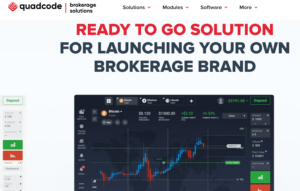Consensus 2023: FV Bank founders discuss collapse of crypto banks, regulation landscape
Nitin Agarwal, co-founder of FV Bank, believes that while Europe’s MiCA framework is a good starting point for digital asset regulation, the US will likely play a more significant role in shaping future regulations and other nations will follow suit.

FinanceFeeds attended Consensus 2023, the world’s largest blockchain and crypto conference. As the world’s longest running and most influential gathering of diverse participants in the crypto community, Consensus has always sought to live up to its name.
The event may have ended, but FinanceFeeds continues to bring you powerful stories from CEOs, executives, and entrepreneurs of the most influential players.
FinanceFeeds Editor in Chief Nikolai Isayev sat down for an exclusive interview with Nitin Agarwal, the co-founder and chief revenue officer of FV Bank, a digital-only bank serving fintech and blockchain companies and international private clients.
The main theme of our conversation was the Markets in Crypto Act, or MiCA, Europe’s first comprehensive package of rules aimed at regulating the cryptocurrency industry.
We were curious to know his take on whether MICA has the potential to be a guiding framework for future regulations in the United States.
Agarwal said that the approval of MICA by the European Parliament is certainly a positive development, and that any regulatory framework implemented anywhere in the world is a good start. However, he pointed out that there have been previous regulations in Europe, such as DLT licenses in Gibraltar, Estonia, and Lithuania. In his opinion, once a major economic power like the US figures out how to regulate digital assets, it will have significant importance and other nations will likely follow suit.
He added that while the MICA framework can serve as a useful reference point for other jurisdictions, he believes the US will play a more significant role in shaping future regulations. The G20 is also discussing the possibility of a global framework to prevent regulatory arbitrage, which can occur in the digital asset world. Overall, he thinks there are promising developments on the horizon for digital asset regulation.
While some market participants consider Europe as more advanced than the US in terms of regulation, we noticed that the countries that provide licenses for digital asset operations are mostly located in Eastern Europe. Additionally, if we look at Europe as a whole, including the larger economies like Germany, France, Spain, and the UK, everything is still being deliberated and studied to formulate a comprehensive regulatory framework.
In Agarwal’s opinion, there is still much work to be done before any definitive conclusions can be made about which region is more advanced in terms of digital asset regulation. It’s also important to consider the unique challenges and opportunities in each region, and to develop a regulatory framework that takes into account these factors.
The level of detail in regulation should be proportional to the risks and benefits of the technology, he further explains, and it should avoid being overly prescriptive or restrictive. The scope of regulation should also be balanced, addressing potential harm while allowing for flexibility and innovation. Ultimately, the goal is to create a balanced regulatory environment that promotes innovation and growth while also protecting investors and consumers.
“While Mica is a good starting point, there is still much to be learned from it, and many more steps that need to be taken to create a comprehensive regulatory framework. The small nations have done a good job as a starting point, but more work needs to be done.”
“I also believe that things are changing in the US regarding digital asset regulation. As you mentioned, there have been concerns about regulation, but there seems to be a growing realization that growth without regulation is not sustainable. While there may be some uncertainty in the short term, I believe that greater clarity will emerge as the regulatory landscape continues to evolve. We will have to wait and see how the US and other nations develop their regulatory frameworks in the coming days.”
In the middle of our conversation, we were joined by Miles Paschini, FV Bank’s co-founder and CEO.
As of today, FV Bank provides a range of services for the crypto industry including depository accounts, payment services, and digital asset custody. The company is also in the process of offering Visa Card issuance for crypto companies, which will be available in the coming months.
Nikolai Isayev outlined a string of bearish headlines, which when added up, seem to indicate a concerted, government-backed effort to cut the cryptocurrency industry off from banking services.
In this context, Miles believes that there is no concrete evidence of the existence of Operation Choke Point 2.0, but rather a collective sentiment and speculation based on certain actions taken in the market. There is no official government memorandum that confirms the existence of such an operation. However, there are certain regulations and laws that do exist and are well-known, thus it should not be perceived as negative if law enforcement is acting upon already clear regulations. It is important to acknowledge the factual actions that have taken place in the market while also being cautious of the information that gets twisted quickly on social media.
“It’s important for market participants to take a proactive approach to compliance and regulation, especially when entering new markets or offering new services. This includes understanding and complying with KYC, AML, and other regulatory requirements. Failing to do so not only puts the company at risk, but it also hurts customers and the overall market. It’s important for companies to take responsibility for their actions and work to improve compliance and transparency, which can ultimately benefit the industry as a whole.”
Miles also believes that some market participants who failed to comply with existing laws and regulations have contributed to the current situation. By not taking proactive measures to ensure compliance with KYC, AML, and other regulatory requirements, these companies have created an environment where regulators have been forced to step in and enforce the rules. On the other hand, the lack of clarity regarding the regulatory status of digital assets has contributed to the confusion and uncertainty in the market. He added that it’s important for companies to understand and comply with existing regulations, as well as work with relevant authorities to establish a clear framework for the digital asset market. This will help to ensure that the market can continue to grow and evolve in a responsible and sustainable way.
Staying on the regulation page, we asked Miles how the regulatory environment has changed over the years and what are the key issues that need to be addressed?
FV Bank’s CEO acknowledges that bad actors have made compliance difficult for those who follow the rules in the crypto industry. He believes that some financial services professionals in the industry should have been aware of basic regulations, such as KYC/AML rules. He stressed that the biggest issue has been custody of assets, which requires qualified custodians to take responsibility for protecting their clients’ assets from theft or hacks. This can be achieved through existing regulatory requirements. He suggests that regulatory attention has increased in this area due to problems with unregulated custodians and bad practices in the industry.
“If you’re going to take possession of someone’s assets, you have certain responsibilities, whether that’s self-regulation or following clear regulation – you shouldn’t be gambling or otherwise using those assets or exposing them to hacks or thefts. You have to follow the legal requirements to have certain safeguards, protections, insurance, audits and all those other things that come with being a custodian of someone else’s assets.”
Overall, Miles thinks the regulatory environment has become stricter and more sophisticated over the years. Initially, regulators may have been unsure of how to handle this new technology, but as the industry has evolved, they have become more involved and issued some guidance and clarifications on regulations. Some of the key issues that need to be addressed include clarity around the classification of cryptocurrencies and tokens and what they are…securities, commodities or something else…., as well as clear guidelines around custody and the responsibilities that come with it. Additionally, there is a need for more harmonization and consistency in regulations across different jurisdictions, as the lack of uniformity can create confusion and hinder innovation. Finally, there is a need for ongoing dialogue and collaboration between the industry and regulators, as both parties have a role to play in ensuring a safe and thriving crypto ecosystem.
“Well, I think one of the things that the regulators can do is to educate the consumers and the market participants about the risks and opportunities of crypto and blockchain. But not just educating the customer, but also coming to the market and saying in a very concise way what are the rules and expectations that they have. For example, they can come to the market and say, these things apply to crypto, whether it’s taxation, disclosures, reporting or licensing or whatever. They can also come to the market and say, hey, there are these aspects that we are still researching or debating, such as when is a crypto token a commodity and when is it a security. And they can give some timeline or guidance on when they will come out with regulation on those aspects.”
“In the meantime, they should not do regulation by enforcement, because that’s not fair to the industry if they haven’t told them what the actual rules are. And when you have different agencies like the CFTC and SEC saying that the same crypto token is a commodity and a security at the same time, well, those two things can’t exist.”
The regulators may have felt an urgency to act on cases involving losses or frauds in the crypto industry, such as those involving Celsius and FTX. The Celsius situation was particularly tragic for individual investors who may never be able to recover their money due to a complicated bankruptcy process. This may have led to a regulation by enforcement approach from regulators in order to protect their reputation and credibility.
Nevertheless, Miles believes that the regulation by enforcement approach is not very effective or helpful for the industry or the consumers, because it doesn’t really clarify what the rules are or what are the regulators’ expectations. It just shows that some companies got fined or penalized for some violations, but it doesn’t really explain why or how.
“I think even in the cases where they have assessed fines, did the market actually learn what the regulation is? We know that certain entities paid fines, right? But did the market get very clear guidance on what is required in this particular space via new regulation or explanation of the applicable existing regulation? We don’t really know. We just know that so and so agreed behind closed doors to pay a fine. And that’s not very transparent or informative for the rest of the industry or the consumers. Thankfully, as a licensed bank and custodian at FV Bank, we understand the regulations we are required to adhere to.”
This answer prompted us to ask Miles about what he thinks would be a better way for the regulators to communicate or enforce their regulations in the crypto space?
The CEO believes that a better way would be to have more clarity and consistency from the regulatory bodies. And he also thinks that consumers need to be more aware and informed about the risks and opportunities of crypto and blockchain. In this context, Miles was even convinced that disclosures are a very common aspect of financial services products. So, if you’re going to offer a crypto product or service to a consumer, you should be required to disclose certain things, such as the risks, rewards, fees, taxes, regulatory status, custody arrangements, etc. And you should make those disclosures clear and accessible and understandable for the consumer. And then it’s up to the consumers to decide whether they want to use that product or service or not. But at least they have some information and some protection from being misled or deceived by some bad actors in the industry.
FV Bank has been in the business of providing banking services to crypto and blockchain companies, which is not a very common or easy thing to do in the US. On the macro scale, the fear of bank failures worldwide has spread and raised concerns about the potential impact on the crypto industry. Signature Bank, one of the last major crypto allies, was recently seized by regulators, following the failure of Silicon Valley Bank. Both banks were important players in the US crypto ecosystem, and if no other bank steps in to fill the void, the growth of the US crypto industry may be severely affected.
We asked Miles how he sees the banking landscape for crypto in the US right now? Is there enough competition and diversity among the banks that serve this industry or, instead, there is a risk of having too much reliance on the few banks that dominate this space.
The Fintech entrepreneur thinks that banking is still one of the biggest challenges and pain points for the crypto and blockchain industry. There are not many banks that are willing or able to serve this industry, because of the regulatory uncertainty, the compliance complexity, the operational risk, as well as the reputational risk that comes with it.
He acknowledges that there is a concentration risk in the banking space for crypto because there are only a few banks that have the experience and the infrastructure to support this industry. And with the growing demand and the shrinking supply of banking partners, that risk is only increasing. Although there are many financial institutions that are thinking about getting into this space, they may not offer the same range of services or products as the existing banks. They often specialize in certain areas or segments of the market that align with their risk appetite and capabilities.
Miles also believes that for banks to enter crypto space, they must understand the unique nature and behavior of crypto-related deposits. These deposits are fluid and volatile, which means they move in and out of the bank quickly and frequently, depending on market conditions and investor sentiments. As such, banks must treat crypto-related deposits differently by having a different investment policy and strategy, ensuring high liquidity through pouring money into short-term investments, and avoiding long-term or illiquid investments. Banks must also have adequate capital reserves and liquidity buffers to manage any potential shocks or stress scenarios in the crypto market. Therefore, banks need to be cautious and prudent when managing their crypto-related business.
FV Bank is based in Puerto Rico, which is a US territory but not a state. There has been some discussion and debate in the US about whether Puerto Rico should become the 51st state or not. We asked the co-founder what were the criteria that made them choose Puerto Rico over other jurisdictions, as well the advantages of being located and operating there.
Miles explains that they chose Puerto Rico as their base of operations after doing some market research and comparing different financial centers around the world.
One of the main criteria, he continues, was to have access to the US banking system, because that’s where most of the crypto trade settlement and transactions happen in US dollars. Puerto Rico, being a commonwealth of the US, has a long-standing history of having access to the US Federal Reserve System and other US banking networks.
Another factor was to find a regulator that would be open and supportive of their business plan, which included providing banking services to fintech and blockchain companies and incorporating digital asset capabilities into FV Bank’s platform.
Miles highlighted that they found the regulator in Puerto Rico willing to listen and grant the permissions that the business needed over time.

“They were more flexible and cooperative with us. So we think we made a wise decision to choose Puerto Rico as our jurisdiction, because it has some advantages and benefits for our bank and for our customers.”
One of the recent products that FV Bank launched is a cross-border FX payments service that allows customers to send and receive payments in different currencies. We asked Miles to tell us a bit more about this service and what are the main benefits or features that it offers?
He clarifies that the cross-border FX payments service launched by FV Bank earlier this year is not specifically for crypto companies, but rather for any of their customers. The service is intended to support international clients with the necessary resources to manage their businesses effectively, providing them with the ability to pay in different currencies.
Additionally, Miles mentions that becoming a full-service partner is a “sticky” feature for FV Bank, as they want to provide their customers with all the necessary banking services in one place to help increase their revenue opportunities. By doing so, FV Bank aims to enhance their relationships with customers and create a more sustainable and beneficial partnership.
“You know, the world has gotten a lot smaller now and while the US dollar is the dominant currency for most of the activity, we have customers who have staff or vendors or partners in foreign countries and they need to pay them in euros or pounds or yen or whatever. We wanted to offer them a service that allows them to do that easily and efficiently. So, this service is really about supporting our customers to be treated like regular customers, not like blockchain or fintech customers who have limited options or access to banking services. We don’t want them to go get their US dollar banking here and their foreign currency payments somewhere else. We want to be their one-stop shop for all their banking needs. So, this service is about becoming a full-service partner for our customers and also increasing our revenue opportunities and creating a more sticky relationship with our customers.”









